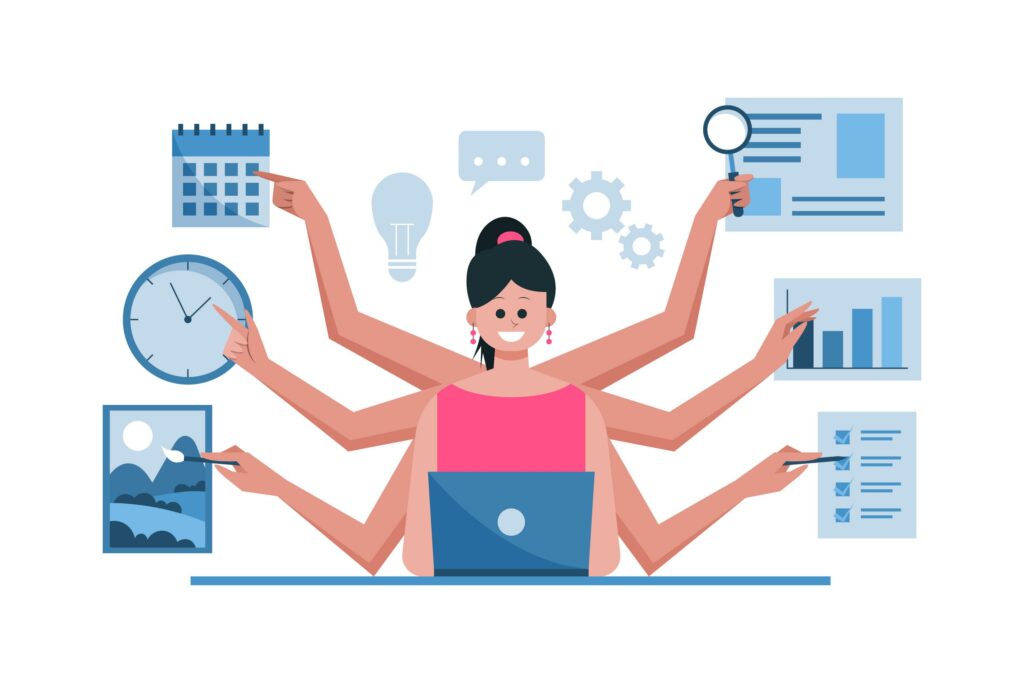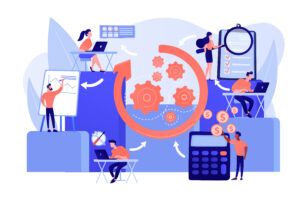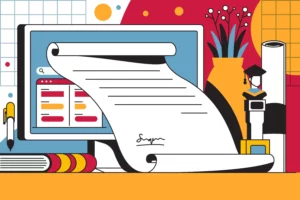When it comes to negotiating contracts, being precise, fast, and strategic makes all the difference. Imagine having a helper who can make your work easier by analyzing tricky clauses, suggesting solutions, and helping you prepare for tough talks. That’s exactly what ChatGPT does.
ChatGPT is a powerful AI tool that’s changing how professionals handle contract negotiations. It can help you think faster, see opportunities you might have missed, and approach negotiations with more confidence. This article dives into how you can use ChatGPT for contract negotiation. It will also cover its limitations, so you know when to rely on it and when to bring in human expertise.
ChatGPT For Contract Negotiation: 7 Ways How You Can Leverage AI

ChatGPT acts as a transformative tool in the contract negotiation process, akin to having a highly efficient and resourceful personal assistant at your side. Its capabilities enable professionals to address complex negotiation challenges with enhanced precision, creativity, and speed. Here’s how ChatGPT adds value to contract negotiations:
1. Clause Analysis: Simplifying Legal Jargon
Contracts are often dense with technical language, which can obscure key terms or risks. ChatGPT excels at breaking down complex clauses into plain, digestible language.
- Example: If a contract includes ambiguous terms like “reasonable effort,” ChatGPT can suggest clarifications, such as defining the scope of effort or specifying measurable standards.
- Benefit: This not only aids understanding but also helps negotiators spot potential risks or areas needing revision, such as vague indemnity clauses or liability caps.
2. Drafting Alternative Clauses
Negotiations frequently require adjusting contract terms to balance interests. ChatGPT can propose alternatives that are fair and aligned with your objectives.
- Example: Suppose a termination clause penalizes one party disproportionately. ChatGPT can suggest alternatives like prorated penalties, mutual termination rights, or shared cost recovery mechanisms.
- Benefit: By offering tailored suggestions, it ensures your contracts remain enforceable and practical while addressing specific concerns.
3. Scenario Simulation: Role-Playing Negotiation Tactics
Preparation is critical for successful negotiations, and ChatGPT can act as a mock negotiation partner. You can simulate discussions, test strategies, and refine your responses.
- Example: Input a scenario where the other party demands higher penalties for late deliveries. ChatGPT might suggest counteroffers, such as extended delivery timelines or penalties tied to specific milestones.
- Benefit: This builds confidence and equips negotiators to handle unexpected counterarguments effectively.
Related Article: Contract Negotiation: Proven Strategies for Collaboration
4. Highlighting Missing or Overlooked Terms
Contracts sometimes lack essential provisions, such as payment schedules, confidentiality clauses, or termination rights. ChatGPT can identify these gaps by comparing drafts against standard templates or industry best practices.
- Example: When reviewing a vendor agreement, ChatGPT may flag missing clauses related to data security or intellectual property rights.
- Benefit: This ensures that contracts are comprehensive, reducing the risk of disputes or operational inefficiencies later.
5. Researching Industry Standards and Best Practices
Every industry has its own norms when it comes to contract terms, and staying informed is vital. ChatGPT can summarize common practices, ensuring your terms are both competitive and fair.
- Example: In a licensing agreement, ChatGPT can provide insights into typical royalty rates or duration terms prevalent in your industry.
- Benefit: This benchmarking helps you negotiate terms that align with current market standards, enhancing credibility and fairness.
6. Brainstorming Creative Incentives and Concessions
Negotiations are about give-and-take. ChatGPT can help brainstorm mutually beneficial solutions, making agreements more appealing to all parties.
- Example: If a client hesitates over cost, ChatGPT could suggest incentives like performance-based discounts, extended warranty periods, or revenue-sharing arrangements.
- Benefit: This fosters goodwill while maintaining focus on achieving key objectives.
7. Summarizing Discussions and Agreements
After negotiation meetings, clarity and alignment are crucial. ChatGPT can summarize key points discussed, providing a concise overview of what was agreed upon and what remains open.
- Example: After a complex discussion, ChatGPT can consolidate meeting notes, highlighting decisions on payment terms, delivery timelines, or dispute resolution processes.
- Benefit: This reduces misunderstandings and keeps all parties on the same page, ensuring smoother implementation of the agreement.
Related Article: Effectively use AI in Contract Drafting
Advantages of Using ChatGPT

1. Saves Time and Enhances Efficiency
ChatGPT can quickly process and analyze lengthy contracts, flagging critical clauses, risks, and ambiguities in minutes rather than hours. This capability reduces the time spent on initial reviews and allows negotiators to focus on crafting effective strategies. For instance, in reviewing a multi-page partnership agreement, ChatGPT can highlight areas where the terms may be unclear or inconsistent, accelerating the revision process.
2. Boosts Creativity and Innovation
Negotiation often requires out-of-the-box thinking, especially when parties are at an impasse. ChatGPT aids creativity by suggesting alternative approaches or clauses that negotiators might not have considered. For example, if a stalemate arises over payment terms, ChatGPT might propose solutions like installment plans or shared risk mechanisms to address both parties’ concerns.
3. Supports Comprehensive Research
ChatGPT is adept at scanning vast amounts of data to identify trends, industry standards, or benchmarks relevant to the negotiation at hand. By ensuring that contract terms align with prevailing norms, it helps negotiators avoid offering terms that are outdated or overly one-sided. For example, in drafting a non-disclosure agreement (NDA), ChatGPT can provide insights into commonly accepted confidentiality periods across industries, ensuring fairness and practicality.
4. Facilitates Scenario Planning and Strategy Development
With its ability to simulate negotiation scenarios, ChatGPT allows professionals to rehearse their strategies. This preparation enhances confidence and helps refine responses to potential counterarguments, enabling a more dynamic and responsive approach during actual discussions.
Related Article: How to Simplify Contract Review with AI? Comprehensive Guide
Limitations of Using ChatGPT
1. Lack of Legal Expertise
ChatGPT is a powerful AI tool but not a substitute for a qualified legal advisor. While it can generate useful suggestions and analyses, it lacks the ability to interpret laws, assess enforceability, or provide advice tailored to specific legal frameworks. A lawyer’s review is essential to ensure compliance and mitigate risks. For example, while ChatGPT might propose a clause for intellectual property ownership, a legal counsel would need to confirm that the clause adheres to jurisdictional requirements.
2. Potential Bias in Outputs
AI outputs are influenced by the data used to train the model. As a result, ChatGPT’s suggestions may reflect biases or inaccuracies inherent in the dataset. For instance, it may prioritize language that is more common in certain industries or regions, which may not be suitable for every negotiation context. Always cross-reference AI-generated outputs with trusted sources.
3. Risk of Overdependence
While ChatGPT can enhance efficiency, overreliance on AI may lead to a reduced focus on critical nuances that require human judgment. Contract negotiations often involve subtle emotional cues, cultural considerations, and strategic decision-making that ChatGPT cannot fully grasp. Relying too heavily on AI could compromise the interpersonal aspects of negotiation, which are essential for building trust and rapport.
Ethical Considerations in Using AI

As artificial intelligence like ChatGPT becomes an integral part of contract negotiation processes, it is crucial to address the ethical dimensions associated with its usage. Ethical practices ensure trust, maintain credibility, and mitigate risks in professional engagements. Below is an expanded exploration of key ethical considerations:
1. Be Transparent: Build Trust Through Honesty
Transparency is fundamental when using AI tools like ChatGPT during negotiations. Informing all parties that AI is part of the process fosters trust and demonstrates professionalism. Concealing AI involvement could raise concerns about authenticity and credibility if discovered later.
For example, if ChatGPT drafts portions of a contract, you might disclose its role by saying, “This clause was generated with the assistance of an AI tool and has been reviewed by legal experts.” This approach reassures stakeholders that the content is both innovative and reliable. Transparency also aligns with ethical business practices, ensuring no party feels misled.
Best Practice: Include a brief note in correspondence or documentation when AI-generated suggestions are integrated into proposals, acknowledging their source while emphasizing human oversight.
2. Verify Information: Ensure Accuracy and Compliance
AI tools like ChatGPT generate insights and suggestions based on probabilistic models, which may not always reflect legal accuracy or practical relevance. As a result, verifying AI-generated outputs with qualified legal professionals is essential.
For instance, ChatGPT might propose a termination clause for a commercial agreement that seems fair but could contradict local employment laws. A legal expert’s review is crucial to ensure compliance and avoid unintended legal consequences.
Best Practice: Use ChatGPT as a starting point for research or drafting, but subject all outputs to thorough legal scrutiny. Treat its suggestions as supplemental rather than definitive.
3. Avoid Misrepresentation: Distinguish AI’s Role from Human Expertise
While ChatGPT can offer creative ideas and technical insights, it is important to clarify which contributions stem from AI versus human expertise. Passing off AI-generated content as solely your own could lead to ethical dilemmas, especially if the outputs are later found to contain inaccuracies.
For example, during a negotiation, presenting a clause as entirely your work when it originated from ChatGPT may lead to accountability issues if the clause is questioned or contested. Proper attribution ensures clarity and protects your professional integrity.
Best Practice: When presenting ideas inspired by ChatGPT, attribute its role in a way that does not undermine your expertise. For instance, say, “Leveraging AI tools, I’ve developed the following suggestions, which I’ve refined based on my professional experience.”
Related Article: Can AI Replace Lawyers? Exploring the Future of Legal AI
The Future: AI and Human Collaboration
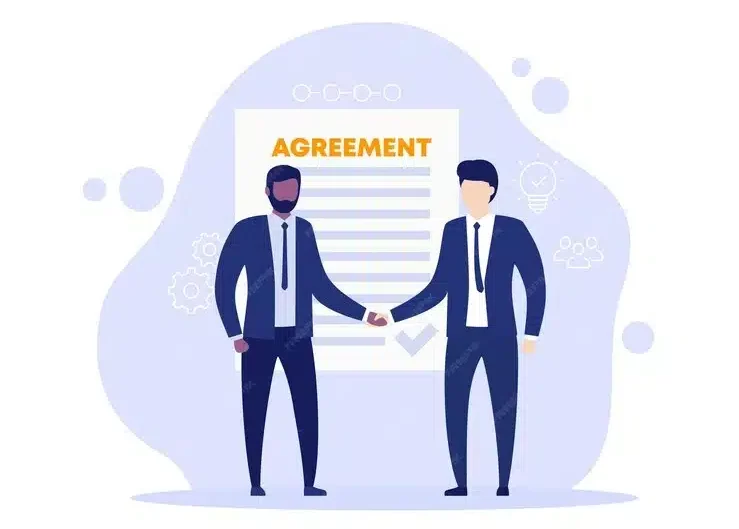
Artificial intelligence is reshaping the landscape of contract negotiation by offering tools like ChatGPT to improve efficiency, creativity, and precision. ChatGPT’s capabilities, such as summarizing contracts, generating alternative clauses, and simulating negotiation scenarios, provide significant advantages to professionals. However, the essence of successful negotiation lies in human judgment, strategic thinking, and relationship-building—elements that AI cannot replicate.
AI is not a substitute for legal expertise but a complementary tool to streamline workflows and offer data-driven insights. ChatGPT, for example, can process vast amounts of data quickly, flag risks in contracts, and propose innovative solutions. Yet, its limitations—such as lack of legal specialization, potential biases, and inability to understand nuanced human emotions—highlight the importance of human oversight.
Volody AI: A Superior Choice for Legal AI Tools
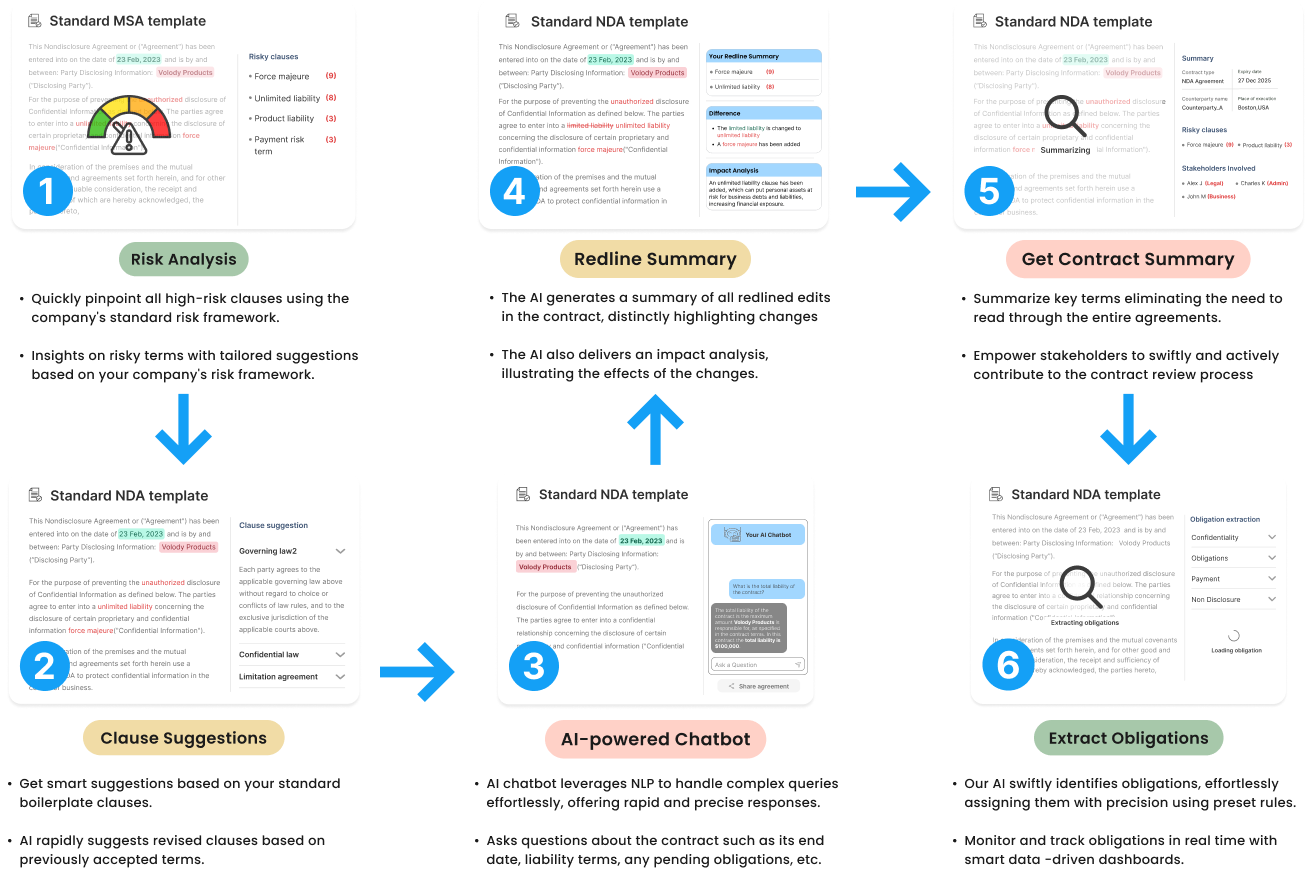
While ChatGPT offers broad capabilities for general use, Volody AI stands out as a specialized solution tailored specifically for legal professionals. Here’s how Volody AI distinguishes itself as a better choice for legal applications:
1. Domain-Specific Expertise
Unlike ChatGPT, which is a general-purpose AI, Volody AI is purpose-built for legal workflows. It understands legal terminology and the intricacies of contract law, ensuring its outputs are more accurate and relevant. This makes Volody AI particularly well-suited for tasks like contract review, clause management, and compliance checks.
Example: When analyzing a termination clause, Volody AI not only highlights potential risks but also provides references to relevant case law or regulatory requirements. ChatGPT, in contrast, might require significant input and follow-up from a legal expert to achieve similar precision.
2. Enhanced Compliance and Risk Management
Volody AI integrates compliance frameworks and legal standards into its processing capabilities. It ensures that contracts adhere to jurisdiction-specific regulations and industry best practices, reducing the risk of oversight.
Advantage: For professionals in highly regulated industries, Volody AI can proactively flag clauses that might conflict with regional laws, saving time and avoiding potential legal disputes. ChatGPT’s generalized approach often requires additional manual review to ensure compliance.
3. Seamless Integration with Legal Workflows
Volody AI is designed to integrate seamlessly with existing contract lifecycle management (CLM) systems, offering features such as:
- Automated contract drafting
- Real-time clause comparison
- Secure data handling
ChatGPT, while flexible, lacks native integration with legal software and may require custom development to fit into a professional legal workflow.
4. Advanced Data Security and Confidentiality
Legal professionals handle sensitive information that requires robust data protection measures. Volody AI prioritizes data security by adhering to strict confidentiality standards and offering on-premises deployment options.
Contrast: ChatGPT operates on a cloud-based model and might not offer the same level of data privacy assurance. This makes Volody AI a safer choice for handling proprietary or confidential legal documents.
5. Contextual Insights and Analytics
Volody AI leverages AI-driven analytics to provide deeper insights into contract performance and risks. It identifies trends in negotiation patterns, helping legal teams refine their strategies.
Example: If a business frequently negotiates indemnity clauses, Volody AI can analyze past agreements to recommend optimal phrasing and predict counterparty responses. ChatGPT lacks the ability to process historical data within an organizational context.
Conclusion
Using ChatGPT in contract negotiation opens new possibilities for speed, efficiency, and creativity. By understanding its capabilities and limitations, you can use it to strengthen your negotiation process. Remember, the best results come from combining AI insights with human expertise. Let ChatGPT boost your skills, but let your judgment lead the way. Together, they make an unbeatable team for successful contract negotiations.
